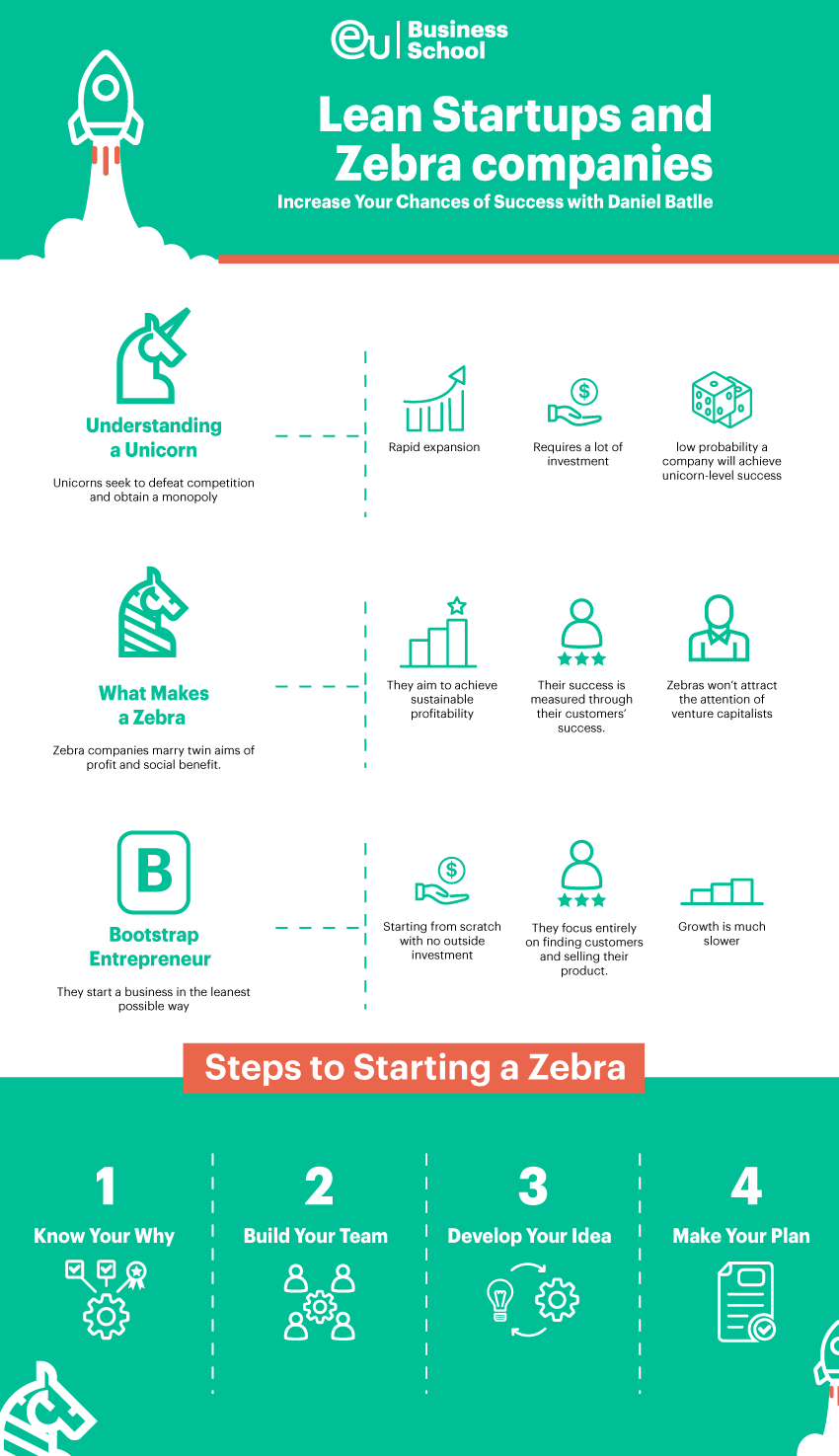Lean Startups and Zebra companies: Increase Your Chances of Success with Daniel Batlle
Many budding entrepreneurs, particularly in the tech space, have their sights set on building a unicorn. Unicorns are privately owned companies that have been independently valued by venture capitalists at $1 billion or more. It’s not hard to understand why startup founders dream of the day their company achieves unicorn status and takes its place alongside household names like Uber, Airbnb and Pinterest.
However, as 90% of startups fail, this scenario remains a dream for most entrepreneurs. What’s more, chasing unicorn status comes with a huge financial cost, making failure extremely expensive. Not only this, but businesses chasing astronomic profits are doing so at the behest of investors and at the expense of their customers, and our planet. The world unicorn companies are seeking to create is not necessarily one that we want to inhabit.
This is why entrepreneurs Jennifer Brandel and Mara Zepeda wrote a manifesto advocating a different approach: the zebra. Sitting at the heart of this model are the twin aims that informed their choice of animal: “Zebra companies are both black and white: they are profitable and improve society. They won’t sacrifice one for the other.”
To better understand the pros and cons of starting a zebra, we invited co-founder and CMO at Alfred Smart Systems Daniel Batlle, to share his experience of using the methodology to start a successful business.
The Crafting Your Future event series runs throughout the academic year and introduces the EU community to entrepreneurs and experts in their fields.

Starting a Business: The Traditional Approach
Daniel asked students to explain how you start a company. The answers came in thick and fast: have a great idea; find a gap in the market; know the problem you are trying to solve; and understand what makes your solution different. These, he said, are all correct and essential steps to starting a company.
However, the approach Daniel advocates has a slightly different set of priorities.
Starting a Business: Bootstrapping and Zebras
Daniel outlined the essential ingredients he believes help founders increase their chances of success.
Understanding a Unicorn
In order to differentiate, it’s helpful to first understand how companies achieve, or strive towards, unicorn status.
First, the purpose that drives them is exponential growth. They are motivated by profit and success is measured through customer acquisition. Unicorns seek to defeat competition and obtain a monopoly. Rapid expansion is a key technique for gaining market control, which requires a lot of investment. The end goal is usually for founders to sell or go public and leave their business having made a fortune. The main pitfall of this approach is the incredibly low probability a company will achieve unicorn-level success, even with access to the vast amounts of funding required to do so.
What Makes a Zebra
Conversely, zebra companies marry twin aims of profit and social benefit. They aim to achieve sustainable profitability rather than huge growth. Zebras focus on achieving quality and pursue mutually beneficial collaborations with other companies operating in the same space. Instead of acquisition, their success is measured through their customers’ success.
The aim of a zebra to build a successful and sustainable business is far more achievable for most business owners than reaching a $1 billion valuation. The pitfall of this approach is that zebras won’t attract the attention of venture capitalists, whose sights are set on much larger profits. However, many investors are seeking more reliable and sustainable investment opportunities, particularly after the well-documented and dizzying fall of unicorn WeWork from a valuation of $47 billion to less than $8 billion in under a year.
A Bootstrap Entrepreneur
In the world of startups, bootstrapping means to start a business in the leanest possible way. That means starting from scratch with no outside investment, the opposite approach to founders of would-be-unicorns. And it comes with its own advantages; entrepreneurs who bootstrap can focus entirely on finding customers and selling their product. They don’t have to divide their attention to seek investment or prioritize pleasing investors. And in a bootstrap startup, the founders retain full ownership and control. The disadvantage of this approach is that growth is much slower, which is why Daniel placed such an emphasis on entrepreneurs knowing their why.
Steps to Starting a Zebra
Daniel outlined the following steps to starting a successful zebra.
1. Purpose: Know Your Why
The first step for founders aiming to build a zebra is to know why they want to start a company.
How you set up your business should be informed by your aims. If you are looking for freedom, happiness, a sense of fulfilment and to contribute to society, then it makes sense to follow the zebra methodology. However, if you are seeking profit, growth and fame, it’s not the right route for you.
2. Prepare: Build Your Team
In an ideal world, Daniel said, a startup will have three founders, each with complimentary skillsets so that, between you, you can perform core business functions. Having a team of three greatly improves your chances of success; founding a company on your own is an incredibly tough journey.
The key roles Daniel identified were:
- A Chief Technology Officer, responsible for the product.
- A Chief Marketing and Sales Officer, to reach customers and secure their loyalty.
- A Chief Executive Officer, to manage finances, investment, partnerships and to maintain an overview of the business.
These titles are specific to a technology company, but the approach should remain the same for other industries. For example, depending on your business you might need a Chief Operations Officer, rather than a CTO.
When forming your team, you should also make sure that one of you has at least three years’ experience of the market you want to enter and understands the pain point you’re trying to solve. Finally, it is vital that you all are driven by the same “why” as this will guide business decisions as you launch and grow.
3. Positioning: Develop Your Idea
Your business idea should come from a vision of what the world will look like in 20 years’ time, and your mission should be defined by what you want your company to contribute.
Once you’ve pinpointed your idea, consider implementing it within a B2B, or business to business, model. Daniel pointed out that B2B businesses can operate on much smaller budgets and spend far less on marketing, for example by using LinkedIn to reach customers rather than expensive SEO and social media campaigns. Having fewer expenses will enable you to bootstrap and increases your chances of sustainable success.
4. Execution: Make Your Plan
Daniel believes that how you execute your idea is more important than the idea itself. How you choose to bring your idea to life will directly impact whether your company is a success. Plenty of brilliant ideas have never taken off.
First, do your homework. Daniel recommended that all eager entrepreneurs read “The Lean Startup” by Eric Ries, which advocates failing fast and often: “The lean startup method is not about cost, it is about speed.”
This approach will help you to build a successful, lean zebra. Instead of creating the perfect product before going to market, innovate on a feedback loop. Start by creating an MVP, or minimum viable product. This should be both cheap and quick. It may not seem immediately obvious how to do this but that’s where your creativity comes in.
To illustrate this point Daniel shared a helpful anecdote about founders from Silicon Valley who wanted to create a room service robot. Building a robot from scratch is not cheap. Instead, to test their concept, they used a small remote control car, attached a board to the top of it, and hired a room in a Las Vegas hotel to demonstrate their idea to potential customers: an investor and a hotel manager. By observing the customer experience and receiving feedback, they were able to determine if their idea was worth pursuing.
Your MVP could be an equally simple mockup of the product you’re planning to create. It’s a means to start a feedback loop that will take you on a circular journey of iteration and re-iteration. Each time you go around the loop you should adjust the product based on data analysis, growing a loyal audience whilst ultimately creating a better solution.
Alfred Smart Systems: A Case Study
Daniel co-founded his company Alfred Smart Systems with the vision of a future where everyone’s home is a smart home. Their mission was to make that possible by building an affordable technological solution that overcame existing barriers to transform new and existing homes into smart homes. They focused on security, efficiency and comfort, factors they believed would most impact the end users.
Daniel and co-founder Manuel started in 2016 selling other services that were available, getting to know the market and the pain points experienced by their customers. By 2018 they were ready to create their own solution and by 2020, having tested and validated their solution, they became the first in the home automation market in Spain. They have plans to expand in Europe and eventually also to Asia and Africa. Having started their company lean, they remain sole owners and have complete control over the next steps they take.
Education for Entrepreneurial Success
Unicorns and zebras are not the only options out there. Before starting your own enterprise, you should get to know other possible models, and understand the ins and outs of running a business day to day.
At EU Business School, we have entrepreneurialism in our DNA. We offer several programs that will equip you with all you need to start your own business, including our Master in Innovation and Entrepreneurship and our MBA in Entrepreneurship.
What’s more, throughout the year we invite students to engage with business experts, entrepreneurs, and leaders of the highest level, to gain insights from those putting their knowledge into action every day to create success.










